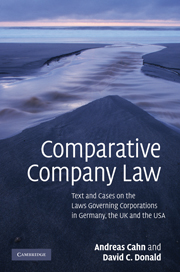 Comparative Company Law
Comparative Company Law Book contents
- Frontmatter
- Contents
- List of figures
- List of tables
- Preface and acknowledgments
- Glossary
- List of abbreviations
- Table of cases
- Table of legislation
- PART I The essential qualities of the corporation
- PART II The corporation and its capital
- PART III Governing the corporation
- PART IV Corporate combinations, groups and takeovers
- SUBPART A Mergers and acquisitions
- SUBPART B Companies in groups
- SUBPART C The market for corporate control
- 24 The regulation of takeover bids and prices
- 25 Management interference with takeovers bids
- 26 Special problems of leveraged buyouts
- References
- Index
24 - The regulation of takeover bids and prices
from SUBPART C - The market for corporate control
- Frontmatter
- Contents
- List of figures
- List of tables
- Preface and acknowledgments
- Glossary
- List of abbreviations
- Table of cases
- Table of legislation
- PART I The essential qualities of the corporation
- PART II The corporation and its capital
- PART III Governing the corporation
- PART IV Corporate combinations, groups and takeovers
- SUBPART A Mergers and acquisitions
- SUBPART B Companies in groups
- SUBPART C The market for corporate control
- 24 The regulation of takeover bids and prices
- 25 Management interference with takeovers bids
- 26 Special problems of leveraged buyouts
- References
- Index
Summary
Required reading
EU: Takeover Directive, arts. 1–8 and 13–16
D: Securities Acquisitions and Takeovers Act (WpÜG), §§ 1–3, 10–26, 29–32, 34–39c
UK: CA 2006, secs. 942–943, 974–991; City Code, General Principles 1–6, Rules 9, 19, 20
US: Exchange Act, §§ 14(d)–(f); Rules 14d-2, 14d-3(a), 14d-5(a)–(c), 14d-6(d) (scan Regulation M-A, Items 1–10)
Regulating disclosure, timing and price of bids
Introduction
What is a “takeover”?
In Chapter 21, we discussed various techniques for acquiring a company. One of those is a purchase of the company's stock from its shareholders. Because the ownership interests of shareholders in the corporation are represented by transferable securities, a company can be acquired through transfer of these securities directly from the current owner to a new owner. Not all stock purchases are takeovers (or, in US terminology, “tender offers”). If a buyer were to approach an entrepreneur and ask whether she was interested in selling five of the 10 million shares of her wholly owned company, this offer would not be considered a “takeover bid” (or “tender offer”) in our jurisdictions. In US law, the term “tender offer” is not specifically defined, as you can see by how much time the court spends discerning the boundaries of this term in Hanson Trust, reprinted in part in this chapter. What, then, are the characteristics the court decides are determinative for a tender offer?
- Type
- Chapter
- Information
- Comparative Company LawText and Cases on the Laws Governing Corporations in Germany, the UK and the USA, pp. 755 - 794Publisher: Cambridge University PressPrint publication year: 2010


